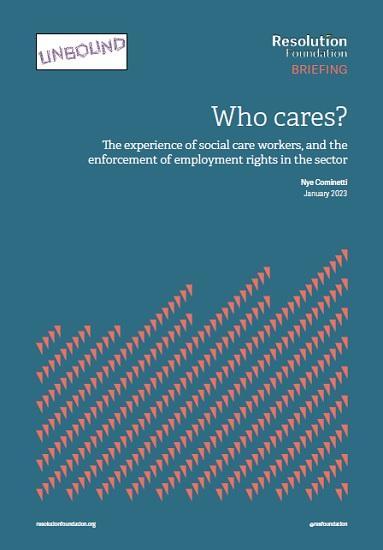Who cares? The experience of social care workers, and the enforcement of employment rights in the sector
27th January 2023

The social care sector, as well as playing a vital role for many people and for our society, is an important employer, with 1.7 million social care jobs across the UK in 2022. Jobs in social care have many positive aspects of working in the sector, including the ability to form deep personal connections with clients, job security, and greater levels of flexibility and autonomy than are possible in many low-paid jobs. But there are many challenges too. Pay is low - and likely unlawfully low for many workers in the domiciliary sector once their travel time is accounted for. This, along with funding constraints and the particular demands of the Covid period, have contributed to a staffing crisis which is having serious negative knock-on effects on workload and safety.
Many of the negative aspects of care work would be improved with better policy. To start with, there should be a sector minimum rate of pay £2 above the minimum wage. This would materially reduce the chance of minimum wage underpayment, and help resolve the current recruitment and retention problems. Domiciliary workers must also be paid for their travel time. And finally, greater effort should be made to improve the security of workers in the ‘personal assistant' part of the workforce, where insecure and informal employment relationships are commonplace.
This report draws heavily on three focus groups with frontline care workers.
Key findings
Working in social care has many positives, especially compared to other low-paid jobs. The human element of the role is immensely satisfying, and workers view their work as high-skilled and high-responsibility. Many also enjoy a significant amount of autonomy. In 2017 (the most recent year of data available), 88 per cent of social care workers reported they were satisfied with their job, compared to 83 per cent of those in other low-paid roles.
There is currently an acute shortage of care workers. In 2021-22, more than one-in-ten (11.6 per cent of) frontline care jobs in England were vacant, up from fewer than one-in-twenty (4.7 per cent) in 2012-13. This has knock on effects on workload and safety. In 1992, 59 per cent of social care workers said they worked under a high degree of tension; by 2017, that had risen to 68 per cent, 14 percentage points higher than those in other low-paid jobs. (Of course, this figure is likely even higher today given vacancies have risen particularly sharply in the wake of the pandemic.)
Social care work is low paid relative to the skills required. Median hourly pay among frontline care workers stood at £10.90 in April 2022, well below the economy-wide average of £14.47 and less than rates offered in low-paid jobs in offices, call centres, transport, and nursing assistants in the public sector. Moreover, the pay ‘premium' that social care workers have historically commanded relative to other low-paid jobs has almost vanished.
Domiciliary workers face a high risk of being paid less than the minimum wage once their travel time is taken into account. A typical domiciliary care worker earning £11.07 per hour and spending the average amount of time travelling between clients (20 per cent of their ‘contact time' - equivalent to 12 minutes for each contact hour) would have an effective hourly rate of £9.20, 30p an hour below the adult minimum wage.
Why do social care workers put up with often poor conditions at work, especially when they are in such high demand? We suggest their power in the labour market is weak for three key reasons. First, the workers in our focus groups were strongly attached to their jobs and often viewed their work as a vocation. Second, and less positively, the feminised nature of the workforce means that for many, outside options are limited. Close to one-in-five (19 per cent) of frontline care workers are women with dependent children, and one-third (33 per cent) of residential care workers live within 2 kilometres of their work, with both figures considerably higher than the economy-wide average. Third, at 20 per cent, rates of union membership are relatively low among frontline care workers (this falls to 15 per cent for social care workers in the private sector).
Read the full report HERE
Pdf 46 Pages
